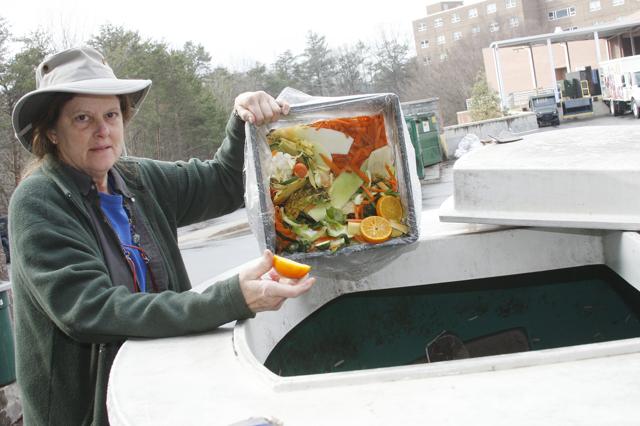Backyard gardeners have been doing it for decades: composting eggshells, apple peels and other food wastes, and mixing the resulting rich, humus-building mix into the soil, reducing their solid waste stream — and greenhouse-gas contributions — in the process. But what about large-scale local food services?
The dining hall at Warren Wilson College, for example, has worked to reduce its waste stream and generate compost for the school’s extensive farming operations. UNCA has also made major strides in reducing and recycling its food waste, providing organic soil amendments for the campus landscaping while reducing waste-management costs.
“We’re very passionate about it,” says Alison Fearn, director of UNCA’s dining services, which feed 2,200 customers daily. “We’ve reduced our postconsumer waste by 3.3 tons per year — and that’s while feeding more students.”
A behind-the-scenes look in the school’s dining hall proves revealing. On the pre-consumer side, staffers “pick through everything they’re throwing away” in a bid to harvest every last morsel, Executive Chef Jeremiah Jackson reports. “Every pepper top, every onion … we go through every bit of it, and it’s signed off by the supervisor before it’s turned over” to the composting operation.
That would be the Earth Tub: a self-contained, on-site composting vessel about the size of a Volkswagen Beetle. Fitted with a spiral auger, it can shred and mix more than a ton of food waste in about 10 minutes. The $25,000 unit was acquired in 2001 through a grant written by Brandee Boggs; then an undergraduate, she now directs the Student Environmental Center. A peek inside the 5-foot-high tub reveals rich, dark organic material with no detectable odor.
“It’s really sweet!” Recycling Coordinator Lynne Patzig says with a grin. “It usually takes three weeks for the tub to reach its maximum capacity,” she explains, “and we maintain a certain temperature for a certain length of time to kill any pathogens.” She also tests the pH: If the mix is too acidic, she’ll add some ashes or lime. After that, it’s moved to a holding area for curing. “It takes two to three months to get a usable soil amendment” that will enrich the perennial flower beds on campus.
But it’s the postconsumer side — including food scraped off diners’ plates — where the waste reduction really ramps up. “Our first level of combat is allocating all the leftover food,” notes Jackson. Unused salad-bar items, juice from the pineapple cores removed during kitchen prep, “every bit of that is going to get turned back into production.”
In addition, “We use very minimal paper products,” says Fearn. “For any to-go, it’s a recycleable plastic Eco-Shell, a reusable clamshell that students pay a $6 deposit for. If they return it, we give them the money back. The only thing that goes into the postconsumer waste [besides food] is napkins, which are all biodegradable and eco-friendly.”
The third postconsumer “waste” stream — food that’s untouched at closing time — goes to Western Carolina Rescue Ministries to feed the needy.
UNCA used to generate one-and-a-half 64-gallon barrels’ worth of postconsumer food waste per day; now, if a single barrel is filled to more than shin-level, they consider whether they could have salvaged more.
“It’s really all connected,” Jackson observes. “Saving the environment, cooking good and healthy food … it’s all part of a big package. To be able to do it on this scale is what’s rewarding: It’s my passion.”
— Direct your environmental news to Susan Andrew (251-1333, ext. 153, or sandrew@mountainx.com).




Before you comment
The comments section is here to provide a platform for civil dialogue on the issues we face together as a local community. Xpress is committed to offering this platform for all voices, but when the tone of the discussion gets nasty or strays off topic, we believe many people choose not to participate. Xpress editors are determined to moderate comments to ensure a constructive interchange is maintained. All comments judged not to be in keeping with the spirit of civil discourse will be removed and repeat violators will be banned. See here for our terms of service. Thank you for being part of this effort to promote respectful discussion.